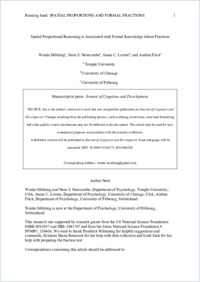Spatial proportional reasoning is associated with formal knowledge about fractions
- Möhring, Wenke Temple University
- Newcombe, Nora S. Temple University
- Levine, Susan C. University of Chicago
- Frick, Andrea University of Fribourg
-
2016
Published in:
- Journal of Cognition and Development. - Taylor & Francis. - 2016, vol. 17, no. 1, p. 67-84
English
Proportional reasoning involves thinking about parts and wholes, i.e., about fractional quantities. Yet, research on proportional reasoning and fraction learning has proceeded separately. This study assessed proportional reasoning and formal fraction knowledge in 8- to 10-year-olds. Participants (N = 52) saw combinations of cherry juice and water, in displays that highlighted either part-whole or part-part relations. Their task was to indicate on a continuous rating scale how much each mixture would taste of cherries. Ratings suggested the use of a proportional integration rule for both kinds of displays, although more robustly and accurately for part-whole displays. Findings indicate that children may be more likely to scale proportional components when being presented with part-whole as compared to part- part displays. Crucially, ratings for part-whole problems correlated with fraction knowledge, even after controlling for age, suggesting that a sense of spatial proportions is associated with an understanding of fractional quantities.
- Faculty
- Faculté des lettres et des sciences humaines
- Department
- Département de Psychologie
- Language
-
- English
- Classification
- Psychology
- License
-
License undefined
- Identifiers
-
- RERO DOC 304977
- DOI 10.1080/15248372.2014.996289
- Persistent URL
- https://folia.unifr.ch/unifr/documents/305899
Statistics
Document views: 142
File downloads:
- Texte intégral: 349
